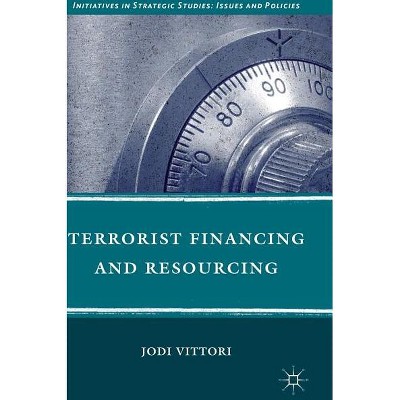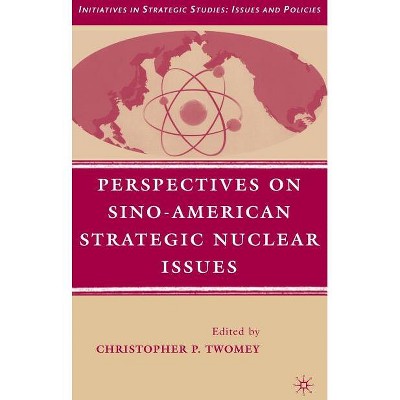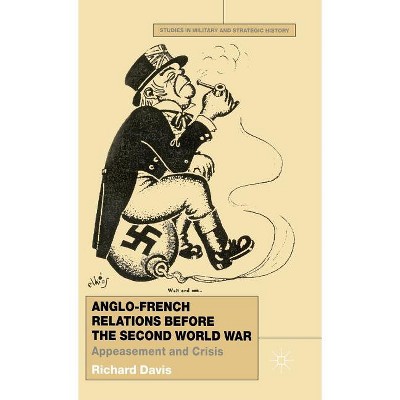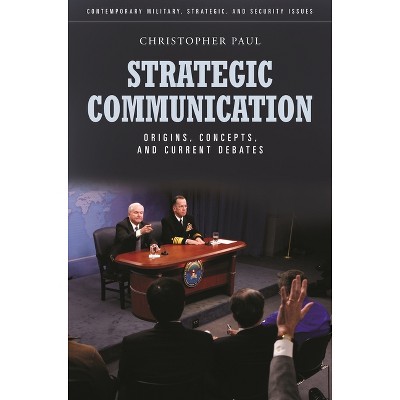Sponsored

The India-Pakistan Military Standoff - (Initiatives in Strategic Studies: Issues and Policies) by Z Davis (Hardcover)
In Stock
Sponsored
About this item
Highlights
- This book focuses on the 2001-2002 crisis that brought India and Pakistan to the brink of war.
- About the Author: ZACHARY S. DAVIS Senior Fellow in the Center for Global Security Research at Lawrence Livermore National Laboratory, USA.
- 240 Pages
- Political Science, International Relations
- Series Name: Initiatives in Strategic Studies: Issues and Policies
Description
About the Book
"This book focuses on the 2001-2002 crisis that brought India and Pakistan to the brink of war. Like the 1999 Kashmir crisis and the 2008 Mumbai crisis, the 2001 attack on the Indian Parliament set in motion events that nearly spun out of control. India's military mobilization raised the specter of full-scale war and the possibility that Pakistan, faced with the defeat of its Army, would resort to nuclear weapons. The volumes authors focus on five main areas: the political history that led to the crisis; the conventional military environment during the crisis; the nuclear environment during the crisis; coercive diplomacy and de-escalation during the crisis; and arms control and confidence-building measures that can help South Asia to avoid similar crises in the future."--Book Synopsis
This book focuses on the 2001-2002 crisis that brought India and Pakistan to the brink of war. Authors focus on: the political history that led to the crisis; the conventional military environment, the nuclear environment and coercive diplomacy and de-escalation during the crisis; and how South Asia can avoid similar crises in the future.Review Quotes
"This book offers the most detailed and expert analysis in the open literature of the 2001-2002 crisis between India and Pakistan. Not only does it provide new insights into the military and diplomatic moves in South Asia, it also contains important lessons for regional security, alliance relations, coercive diplomacy, crisis management and nuclear deterrence. Given the checkered history between these two South Asian rivals, the cautionary lesson from this volume is powerfully relevant today: that the factors that led to a successful de-escalation in 2001-2002 may no longer be present or effective when the next crisis comes." - Mitchell B. Reiss, President, Washington College and former Director of Policy Planning, U.S. Department of State, 2003-2005
"The 2001-2002 confrontation between India and Pakistan was a nuclear near-miss. Dr. Zachary Davis superbly edited volume places the crisis in historical context and helps us understand how - to borrow a phrase from Thomas Schelling - these two dynamite trucks managed to swerve and avoid a collision. Especially in the contributions from David Smith, Praveen Swami, Gurmeet Kanwal and Feroz Khan, we see how these rivals perceived the crisis and worked to avoid the worst outcome. In an especially valuable chapter by Michael Krepon and Polly Nayak, we also see the important role played by US policy managers. A decade after the crisis, the danger that terrorists will foment another Indo-Pak confrontation persists. This outstanding collection helps us understand how the 2001-02 crisis started and, more importantly, how conflict was averted. As such, it contains critical insights for the optimists about what can be done now to avoid a rerun, while for the pessimists it provides guidance on how to manage the next one." - Neil Joeck, Senior Fellow, Center for Global Security Research, Lawrence Livermore National Laboratory
About the Author
ZACHARY S. DAVIS Senior Fellow in the Center for Global Security Research at Lawrence Livermore National Laboratory, USA.Shipping details
Return details
Trending Non-Fiction











